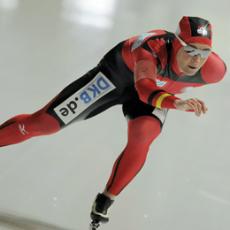
FAITH LAPIDUS: This is SCIENCE IN THE NEWS in VOA Special English. I'm Faith Lapidus.
BOB DOUGHTY: And I'm Bob Doughty. Today, we tell about sports doping – the use of drugs or other substances to improve athletic performance.
(MUSIC)
FAITH LAPIDUS: Sports have long been part of popular culture. In the United States, some athletes are as famous as movie stars or rock musicians. Their lives are described not only in the news media, but in films and literature. Sports have found their way into everyday expressions. One example is: "It's not whether you win or lose, but how you play the game." That saying has been used for years to define honor in sports. But today, many people question the honor of some athletes.
BOB DOUGHTY: Barry Bonds holds the Major League Baseball record for most homeruns in a single season. He also holds the record for the most career homeruns. Last month, he went on trial in San Francisco, California. He was accused of lying to a federal grand jury about his reported use of performance-enhancing drugs. He has repeatedly denied knowingly taking such drugs.
(MUSIC)
FAITH LAPIDUS: When many Americans talk about sports doping, they think of anabolic steroids. Most sports organizations have banned the non-medical use of anabolic steroids. But some athletes continue taking them. They believe steroids help them when competing.
Steroids are used to increase muscle strength. Yet they also can damage the liver, increase cholesterol, and stop production of testosterone. And they can cause personality changes. Steroid users may become angry for no reason. Some become dependent on steroids and feel they cannot live without them. Users can become depressed and, in some cases, may even want to take their own life. Some men who use anabolic steroids develop breasts and their reproductive organs shrink. Some women develop a deeper voice and grow facial hair.
BOB DOUGHTY: Testosterone is a steroid hormone. Hormones are chemicals that help keep the body working normally. The effects of testosterone can be seen in boys when they become young men. They develop muscle power and become stronger. Testosterone is also important for other changes, like a deeper voice and the growth of hair.
Both men and women produce testosterone, but men produce much more of it. But not all males produce the same amounts. Some naturally have higher levels than others. As men grow older, their testosterone levels drop.
FAITH LAPIDUS: Some people take testosterone supplements for medical purposes. But some athletes use testosterone to strengthen their muscles and improve performance. Testosterone supplements are banned in many sports. Researchers who have studied testosterone generally agree that long-term use may increase athletic performance. But they disagree about the short-term value. Also, testosterone supplements have risks. Most doctors agree that taking large amounts of testosterone can cause an increased risk of heart disease or other health problems.
(MUSIC)

BOB DOUGHTY: Discovery of banned drugs and drug use at a major sporting event led to creation of the World Anti-Doping Agency. In 1998, French police carried out a raid and found banned substances at the Tour de France.
After that, the International Olympic Committee led efforts to create an independent agency to set and enforce common anti-doping rules. WADA, as the agency is known, has representatives of the Olympic movement and officials from around the world.
FAITH LAPIDUS: "Doping" is the general term for the use of banned substances or activities to improve athletic performance. WADA says the term probably came from the Dutch word "dop." It was the name for an alcoholic drink that Zulu fighters used to improve their performance in battle.
The agency says the word "doping" began to be used for athletes in the beginning of the 20th century. At first, it meant the illegal drugging of racehorses.
The agency notes that athletes have used substances for centuries to improve their performance. Ancient Greeks used special foods and drinks. Nineteenth-century cyclists and others used alcohol, caffeine, cocaine -- even strychnine, a strong poison. By the 1920s, sports organizations were attempting to stop the use of doping substances. But they lacked scientific ways to test for them.
BOB DOUGHTY: One method of doping is called blood doping. It is the use of substances like hormones or even blood itself to increase production of red blood cells. That way, the blood moves more oxygen to the muscles, increasing their strength. One such hormone is EPO. It is said to be most-useful to athletes in endurance sports such as cycling and distance-running. Yet doctors say hormones used for blood doping thicken the blood and increase the chances of heart disease or stroke. And the use of blood from another person can spread viruses. But doctors say even the use of a person's own blood to increase the level of red blood cells can raise the risk of heart disease and stroke.
Another substance that can improve performance is human growth hormone, or HGH. This hormone is produced naturally by the pituitary gland in the brain. Experts say higher than normal levels of the human growth hormone can cause diabetes, muscle and bone pain, high blood pressure or other disorders.
FAITH LAPIDUS: The White House Office of National Drug Control Policy provided a statement about sports doping to VOA. The office said it understands that athletes have a powerful effect on young people. The Office of National Drug Control Policy said it works closely with anti-doping agencies in the United States and other countries. And it attempts to influence sports organizations throughout the world to create policies to fight the use of performance-enhancing drugs.
BOB DOUGHTY: Sports dopers are always looking for new substances and technologies to help them pass drug tests. In March, a court based in Switzerland decided that an athlete may be punished for illegal doping even if she or he does not fail such a test. The Court of Arbitration for Sport is sport's highest court. Its ruling may influence sports doping testing around the world. The ruling was the Court's first after examining the scientific and legal strength of an athlete's "biological passport." Information in a biological passport can help catch athletes who use banned drugs but find ways to avoid testing positive for them. These athletes are known as sophisticated dopers.
(MUSIC)
FAITH LAPIDUS: David Epstein writes about sports doping for Sports Illustrated magazine.
DAVID EPSTEIN: "Right now there are plenty of methods of doping that are mostly or completely un-detectable. You can dope, and stay within the limits of testing. You know there are a lot of ways to dope that are still cutting-edge compared to the anti-doping technology that we have."
FAITH LAPIDUS: So, what is wrong with doping? That is a question many people ask -- even some health experts. These people support what has been called medically-supervised doping. They say it would reduce the dangers of doping. They say sporting events would be fairer if all the competitors were openly permitted to take part in doping. David Epstein says his readers react strongly when he writes about medically-supervised doping.
DAVID EPSTEIN: "Some saying we need to root this out, and others saying, get over it, we understand it's happening, quit kind of ruining the fun."
BOB DOUGHTY: The World Anti-Doping Agency opposes medically-supervised doping. Its medical director, Alain Garnier, has said doctors should have nothing to do with doping. Doctor Garnier says helping athletes perform better is not necessarily good for their health. He says it is wrong to say that permitting doping would create an equal playing field. To accept doping, he says, would let economic resources and scientific expertise decide athletic events. And, he says, only those with the resources and the expertise would win.
Anti-doping officials say they want to protect the integrity of sports by guaranteeing what they call a level playing field. They want to ensure that athletes who do not use banned substances have an equal chance at winning.
FAITH LAPIDUS: David Epstein says some athletes have told him they would give up years of their life if by taking drugs they could become a champion.
DAVID EPSTEIN: "I think some athletes absolutely have said they're willing to sacrifice their health down the road. I think a lot of them simply don't think that it will have a long-term effect on their health."
(MUSIC)
FAITH LAPIDUS: This SCIENCE IN THE NEWS was written by Christopher Cruise. June Simms was our producer. I'm Faith Lapidus.
BOB DOUGHTY: And I'm Bob Doughty. Join us again next week for more news about science in Special English on the Voice of America.
anabolic steroids: any of a group of synthetic steroid hormones (androgens) used to stimulate muscle and bone growth for therapeutic or athletic purposes 合成类固醇
strychnine: an extremely poisonous, white crystalline compound derived from the seeds of the nux vomica tree; Strychnine is an alkaloid and was formerly used in medicine to stimulate the nervous system. It is currently used as a rat poison. 士的宁
pituitary: 脑垂体的
Phelps apologizes for smoking dope, letting down fans
China launches anti-doping agency
Anti-Doping Agency Seeks to Ban Four Top Runners
What is Doping Control & Anti-Doping?
(来源:VOA 编辑:崔旭燕)
